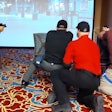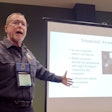Two officers were at a restaurant having lunch when a crackling radio voice froze them in mid-chew, "Baby, non-breather." The younger officer, his third day in the field, recognized the address to be a motel directly next door to the restaurant. He and his partner hurried out the door. Numerous scenarios flashed through the rookie's mind as he ran toward the motel, his veins pumping with adrenaline. This was his chance to do what he had waited a lifetime and seven long academy months for: to save a baby's life.
The rookie flung the wood door open and rushed to the stricken child. But the baby had been deceased for several hours, the victim of a tragic death.
During the drive home, he struggled with the anger and disappointment every new officer feels while learning the stark realities of a day on the job. He knew he would recover, but he also knew he would never be the same. Moreover, he would not be able to relay the experiences of his weekend around the water cooler on Monday. He would have no squad, no FTO, to discuss these issues with. You see, this rookie was a reserve officer.
Critical Reserve Contributions
Regardless of a police agency's size, a quality reserve and volunteer organization can be vital to the protection of the community, the public's perception of law enforcement and the effectiveness of crime prevention programs.
Lt. Tony Gregory is a typical example of how critical reserve officers can be to municipalities, particularly in smaller cities. Gregory, who is vice president and general manager of an audio important company, is also the department firearm trainer and reserve lieutenant for the Cumberland (Ind.) Police Department. He is quick to point out the crucial role his reserve officers' play.
"We have seven paid officers and 10 reserves at Cumberland," Gregory says. "This department couldn't function without its reserves."
All of Cumberland's officers are designated Level A, which means they have full peace officer powers both on and off duty.
"All of our officers are well-respected and have a good relationship with the paid officers," explains Gregory. "Of course, we want them to know we can do our job."
Even in larger departments, the impact of reserve efforts can be felt. Gregory was a reserve deputy for the Marion County (Ind.) Sheriff's Department prior to coming to Cumberland. Marion County is the most populated area in the state and includes Indianapolis within its boundaries.
"Marion County has about 140 reserve deputies, many of whom have take-home cars. That's how important they are to the livelihood of the Sheriff's Department," Gregory says. "The county saves about $1 million a year in operational costs by using reserves."
The San Diego Police Depm1ment is another agency that benefits from reserve contributions. With a growing reserve force of more than 60 Level 1 officers, Reserve Coordinator Sgt. Bridget Barnett says that more than 35,000 man-hours were worked in 1995 by reserve officers. "That's a lot of hours that the city didn't have to pay (for) to keep a police officer on the streets," says Barnett.
Retired Cmdr. Chuck Adams agrees. Adams, who retired after 24 years with the Los Gatos (Calif.) Police Department, now helps head the California Reserve Peace Officers Association (CRPOA). Adams says that there are about 14,000 reserve officers in California.
"This number includes all levels of reserves from volunteer technicians, disaster response teams and Level I full peace-powers officers," declares Adams. "But even if you factor in a very minimal number of 12 hours of service a month, that means over 2 million hours of volunteer service a year. And that's being very conservative."
Adams points to several examples of reserve success at his own department. "Los Gatos is a town of about 28,000. On weekends, because of tourists, it usually doubles in size. The chief has said many times that he couldn't function without reserves because of the staffing problems inherent in fluctuating populations."
The 1994 World Cup extravaganza proved the mettle of reserves. "We had the Brazilian team staying in Los Gatos," Adams explains. "On a typical night, we had over 100,000 people visiting. Without reserves, the city would have been in trouble."
Training Concerns
Full-time officers often express concern about the lack of sufficient training in some reserve programs. The inherent nature of a reserve officer dictates that he will typically have some other paid job that supports his family, occupies his weekdays, etc. But the exceptional demands of law enforcement also require that a reserve officer spend enough time in training.
The training requirements for reserve officers vary greatly from state to state. Gregory says the training requirements in his state change from department to department.
"The state of Indiana initially requires a minimum of 40 hours of training to become a reserve officer, with an additional 12 weeks of training to be completed within the first year," says Gregory. "In order to be hired as a paid officer, you must attend a state-approved academy. There are only three in the entire state."
Other agencies, like the Marion County Sheriff's Department, have their own reserve academy.
"It's very much a hard-core, spit-shine, 480-hour academy. Unfortunately, not all reserves go through it," says Gregory.
Interestingly enough, the Marion County academy is not state-certified, so any officer who trains there must repeat the identical process at a slate academy if he or she wants to be hired as a paid officer. This redundancy can be troubling for those reserve officers considering future paid positions. But Gregory's biggest concern is the lack of training for reserve officers who haven't attended a full academy like the one in Marion County.
"There needs to be some standardization of training," Gregory says. "Here in Indiana, they are trying to develop reserve academies statewide, but it couldn't come soon enough."
Too Much of a Good Thing
On the other end of the spectrum, stringent training requirements may hurt reserve programs in the long run. For example, changes in California enacted by the POST Commission could be disastrous for reservists. Known as Module D, this 1997 legislation will allow two things to occur. First, it enables Level I reserve officers to complete the necessary academy hours to obtain their full basic POST certificate. This will, in turn, give reserve officers the opportunity to move laterally to any full-time paid position within any department that accepts POST certification. Second, it will establish minimum training hours for new reserve academies according to the basic POST requirements for full-time officers. At present, according to a (CRPOA) newsletter, POST has increased the minimum training to 664 hours per year.
In other words, the average reserve recruit will have to spend more than three-quarters of a year, four to five nights a week and weekends doing a job he is not getting paid for. This does not take into account the stresses of a second full-time job, family, outside activities, etc. As a reserve officer, I can attest; the 500hour academy I attended essentially took every free moment I had for seven straight months. While I am glad I did it, I must also mention that I have a very flexible schedule and have no children. But many reserve officers don't have that kind of time or flexibility.
"People become reserves for many reasons," says Adams. "But if you are talking about professional Level I reserves, it's going to be hard to find people willing to spend that much time in an academy. By professional reserves, I mean those officers who have full-time jobs and have no intention of ever working full time for a department."
Dr. Lawrence Heiskell is a perfect example of a professional reserve officer. Heiskell, an emergency room physician, has served the Palm Springs (Calif.) Police Department for three years. In that time, he has served a unique role as the department's SWAT team physician. In addition to his current emergency room duties, Heiskell also teaches a tactical emergency medicine course for H&K. develops emergency medical programs for police departments countrywide and writes for various law enforcement journals. For him, being a reserve officer is easy.
"Growing up, I always wanted to be an FBI agent, but my parents wouldn't hear of it," says Heiskell. "My dad taught science, so I got into biology and medicine. I was doing my residency in Bakersfield (Calif.) in 1989 when I was approached by the Kern County Sheriff's Department to be their SWAT team medic. When I moved to Palm Springs, I transferred to their department."
Heiskell believes the new requirements will hurt reserve programs, especially at small agencies.
"There are many professionals who would love to be reserves and give something back to their community," says Heiskell. "But there's no way you're going to get them to give up that many hours at one time. If you let them work at it through regulated training periods over a couple of years, then maybe. But that many hours at one time? No way."
Heiskell understands the value of training, but believes a person who already has a full-time job will shy away from volunteering when confronted with so many academy hours.
"So many people in this country are so selfish they can't even donate 20 hours a month to community services," says Heiskell. "Reserves work full-time jobs, have families and still have time to put their lives on the line to contribute to their community. Anything you do to discourage them from applying will kill the Level 1 program in a few years."
Heiskell also believes that departments must make themselves available to older, more experienced individuals.
"There's a trade-off between age and experience," he says. "Most academies are designed to tear you down mentally and physically, then build you up. This is necessary when you are dealing with a 21-year-old. But you don't need that with a 42-year-old professional. He just needs to be educated in law enforcement.
''I'm a perfect example," Heiskell adds. "There's no way most agencies could afford a $150,000-a-year doctor. Yet, here I am for free."
A Tough Sell
Reserve programs have always been a double-edged sword for the recruiting efforts of police agencies. On one hand, reserve programs serve as a perfect resource for choosing competent officers who have already demonstrated the ability to be successful officers. This fact makes reserve programs attractive to individuals seeking full-time employment with an agency. Often, a person will become a reserve officer because a particular department is undergoing a hiring freeze, or the individual cannot be hired full time light away. For example, an individual seeking employment with a police agency may also be someone awaiting release from the military.
On the other hand, police departments with identical hiring standards for reserve and full-time officers, as is the case in San Diego, can experience an on-going "gutting" of reserve pools by recruiters searching out those officers wanting full-time employment. In the long run, the only officers left in the pool will be professional reserves. Hence, the problem with Module D-type reserve requirements becomes apparent.
"The guys who want to work full time will just go through a basic POST academy," adds Adams. "They won't even consider a reserve academy. If the hours are the same, why would anyone want to go through a reserve academy?"
The same sentiment holds true when it comes to departments putting the Module D framework into effect.
"POST allows each department to specify how they are going to use their reserve officers," adds Adams. "If I am a chief and I know that if I put my reserves through Module D, they can work for any agency in the state, why would I want to do that and risk losing them?"
Fostering Respect
Reserve officers want respect from the community and other officers. After all, a typical Level I officer in Southern California will have been through hundreds of hours of training. He will have worked by himself and responded to many calls for service that some fulltime officers may never experience, all in an effort to give back to his community. Any attempt on a department's part to segregate reserves from full-time officers can cause problems.
"Any time you make reserve officers look or act different from full-time officers, you're causing inherent tensions," says Adams. "When I first started, we had to wear white uniforms that had a large 'Citizen Volunteer' printed on them. Now who's going to take you seriously with that printed on you?"
Thankfully, such labels have been eliminated over time, but some divisions still exist. For example, the San Diego Police Department still requires its reserve officers to wear silver badges instead of the gold ones full-time officers wear. Consequently, paid officers will sometimes immediately prejudge an officer's ability simply by the color of his badge.
Furthermore, suspects and the public may question a reserve officer's authority when they see a different color badge emblazoned with "Reserve." This is especially unwarranted and unnecessary, considering the typical Level 1 reserve officer in San Diego has more training hours than many full-time officers in the United States.
"Reserves want to blend and let their actions speak for themselves," says Heiskell.
Adams agrees: "There's a new bill in the California legislature that will allow reserves to be CCW 24 both on and off duty. Right now, you have a reserve work an 8-, 10- or 12-hour shift writing tickets, arresting people and the like. Then you bring him in, strip him of his badge, uniform and gun, and ask him to walk back out the door into the same crowd that he just finished messing with," says Adams. "You wouldn't catch a full-time officer doing that. A reserve faces the same risk and deserves the same respect."
And for those chiefs who claim liability risk as the reason for the difference in treatment, Adams offers this candid reply: "If you trust a reserve officer to drive your police car, uphold the law, partner with full-time officers, arrest people, work alone, etc., what message are you sending him, when you send him home stripped of his peace powers? Where's the respect in that?"
John Pentelei-Molnar is a POST instructor and reserve police officer in San Diego.










